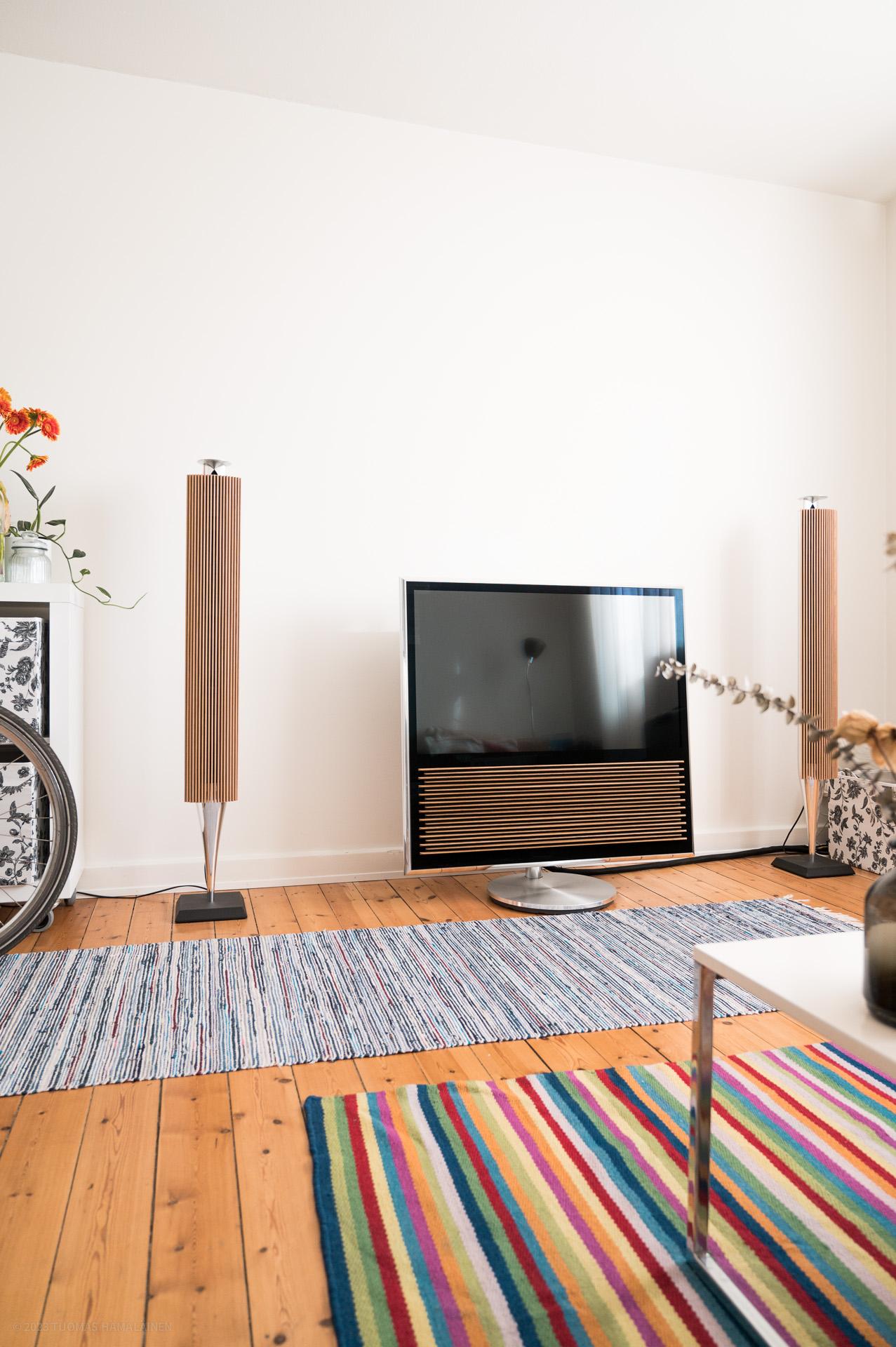Forum Replies Created
- AuthorPosts
-
The distance should be measured from the tweeter of the speaker (essentially from the middle of the disc on top) to your listening position (the point directly in between your ears). You can see this in the many illustrations in Beolab 50 Technical Sound Guide.
I can’t answer the questions around Beosound Core without much experience from that product, but as the person who designed and developed the user interface for Beocreate and quite a lot of the DSP layout for some of the HiFiBerry boards, I’m curious about some of these issues…
- Which HiFiBerry board are you using in your system?
- The speakers have signal sense in the optical input and they should go to standby after a minute or two of receiving no signal. That it doesn’t happen on yours suggests either something on the Raspberry Pi (or the sound card) is constantly generating a signal or that the signal sense does not work properly on the speakers. This could be related to the pops you’re experiencing.
- I have used a Beocreate 4-Channel Amplifier connected to the optical input on a Beolab 18 and 20 (both of which have essentially the same “sound engine” as the 17) and both go to sleep automatically after I stop listening – also without any audible pops.
- Regarding the “sync” of volume control between AirPlay and the HiFiBerry system, this is likely handled by the shairport-sync (the open-source AirPlay receiver we use) application. I don’t have immediate solutions but may have a chance to investigate…
- I would also love it if you could share details/code how your Essence integration works. It’s been my dream to add this to the Beocreate platform some day but haven’t had the time.
Beoremote One can switch to infrared mode to control older products, the same as it can switch between multiple Bluetooth products.
When stereo paired, the speakers act as a single system with a left and a right speaker. Any source, including line in when connected to the primary speaker, will play in stereo through both.
Do note that even with the low-latency line in option turned on, you are not going to get an instant response from the turntable, as the system needs to allow time – around 300 ms currently – for the stereo signal distribution between the speakers. The option is only going to disable the delay required for Beolink Multiroom to play in sync across rooms.
I carry these around fully assembled every so often. I grab the bottom of the main body (it fits nicely in the hand) and then use the other hand to support from the spine of the speaker. Whilst we haven’t had any issues doing that, treat it as unofficial advice and proceed carefully at your own risk.
The instruction to hold down < and > keys is what you need to do. You enter network setup mode by holding them down for 2 seconds – you will hear a tone confirming this and the product indicator (play/pause LED) will start flashing orange. If you take care of the timing, there’s no risk of accidental factory reset – you will have to hold the buttons down for 8 seconds for this to happen.
If you are completely changing your router, as in, you’re taking down the old network and the products can’t connect to it anymore, they will also automatically go into network setup after being power cycled.
I looked through settings for my Balance, and it looks like Mozart based products need to be re-configured from start to change their network. I’d be happy to learn otherwise, but I don’t see a “Configure” menu item like on the ASE equipment.
This is not the case. You can press and hold the next and previous buttons on the product at the same time for two seconds. The product status indicator should begin flashing orange, and your product is in network setup mode. Now you can go to the Bang & Olufsen app and connect the product to a new network. Often this is possible through a notification that is shown above your list of products. If you don’t see that, you can go through the “add new product” flow and find your product there. Despite going through that flow all your other settings should be preserved.
Glad it was helpful.
The only way to play music wirelessly on Beolit 12 is to use AirPlay – it does not have Bluetooth at all. In most music apps there is a menu to choose which audio output to use, otherwise you can find the menu in Control Centre, by tapping the little AirPlay symbol in the top right corner of the “Now Playing” tile.
Thank you. In other words, any LG TV settings: contrast, brightness, sharpness, zoom and others are possible with the help of the BR1 remote control, but only when it is connected to B&O equipment. Or using BR1, it is only possible to adjust the sound and sources, and the picture settings of the LG TV are possible only from the LG remote control?
You can navigate all of the LG television menus using Beoremote One. Some options that are available as direct buttons on the LG remote will be in the List menu on Beoremote One.
The remote control must be paired to the soundbar, which in turn will control the television via the HDMI and LAN connections between the two. The soundbar is responsible for a lot of information exchange between the remote and the television – for example, it will populate all the source lists and List menu items on the remote control.
Even if it is possible to pair it directly with the television (it will pair with other equipment such as Apple computers), you likely would miss both essential as well as nice-to-have functionality.
Unfortunately the possibility to set up these older Wi-Fi speakers has been retired from the Bang & Olufsen app. However, you can always set up your speaker outside of the app. You’re already on the right track, so just proceed from where you are connected to the temporary Beolit 12 setup hotspot.
- Open Settings on your iPhone and go to Wi-Fi settings.
- Make sure you’re connected to the Beolit 12 hotspot.
- Tap on the little “i” button next to the network name, a new screen with network details opens.
- Scroll down to the “IPv4 Address” section. There, find item named “Router” and note down that IP address (you can also press and hold to copy it).
- Go to Safari, type or paste in the IP address from previous step and tap Go.
- You should end up in the “black pages” of the Beolit 12, where you can set up the speaker to connect to your main Wi-Fi network.
Let me know if this worked for you.
There’s a huge leap in sound from Beosound 1 to the A5 – it’s much more capable in terms of bass and creating space around it (especially when placed closed to a wall and set to “front” directivity).
A Beovision 14-40 recently joined existing Beolab 18 to complete our living room setup (for now anyway). Hopelessly outdated as a smart TV but works great when configured as a dumb TV. The design is where it’s at, though – this is at the top of my list of most iconic televisions ever made.

The top panel of Beosound 1 is entirely based on capacitive touch, there is no physical button. What might explain the behaviour you’re seeing is that the measured capacitance value is affected by how much surface area of your finger makes contact with the touch sensor – when you press harder, a larger part of your finger is squished against it. That said, activating the centre button should not require force if it’s working properly, at least based on the Beosound 1 Mk2 that I tested here.
My Theatre just got the 2.5.5 update. In the report I find this: ‘Long press now activates PUC function’. Anyone knows what that means….what is the purpose/benefit?
Some set-top boxes have functions that should be activated by press and hold on the remote. Previously press and hold has not sent remote control commands through the PUC, which it should now do.
Yes, the BS1’s rotary volume knob is easier to use than the Level’s touch control, where you can miss and “set-to-here” the volume rather than increment or decrement the volume at the edges. (Particularly annoying when you get max-volume instead of +1!)
For the record, that is not how the Level volume control works. You can’t instantly “jump” to maximum volume (or any volume step really) by missing the plus symbol – touching anywhere on the scale will gradually increment or decrement volume up until you reach the step that you’re touching or let go, whichever is sooner. Effectively this means that anything to the left of current volume step is part of the minus button and anything to the right of current volume step is part the plus button.
In my opinion, MQA is a dead man walking. It attempted to solve a problem that no longer exists (insufficient bandwidth to stream lossless audio). Besides this, they have consistently failed to deliver proof to support their sound quality claims, all while doing what they can to hinder independent efforts to measure what the format actually does to the sound (I recommend watching GoldenSound’s videos on the topic to get an idea). The gist seems to be that MQA is far from being a lossless format that preserves the original master.
There’s also the fact that Tidal is now adding support for actual high-resolution lossless files, and the MQA company has gone into administration.
To be fair, there’s some truth to MM’s comment – Beosound A5 is more comfortable to be taken on the go thanks to its design (handle, it stays upright more securely, tactile buttons for operation).
The power supply concerns me a little – the output is rated at a combined 280W RMS and yet it appears that the USB-C module can only handle 45W.
It is 280 W non-clipped peak power, not RMS. You’re only ever going to see very short bursts where the amplifiers are going to output that much. The battery capacity is rated 66 Wh (9000 mAh, before safety buffers that are created in software) and the product should play about 4 hours at maximum volume, which also gives some indication of power consumption.
Hi, I also prefer the A5 to the Level for sound, I will follow up with a side-by-side test video soon. The room compensation can be run at any time via the app using the A5 internal mic, you can’t save this but you can just run it again if you move the speaker. Kind regards, Steve.
RoomSense is currently available only when the product is plugged in. When unplugged, it will switch off the room compensation filters, same as Beosound Level.
- AuthorPosts
